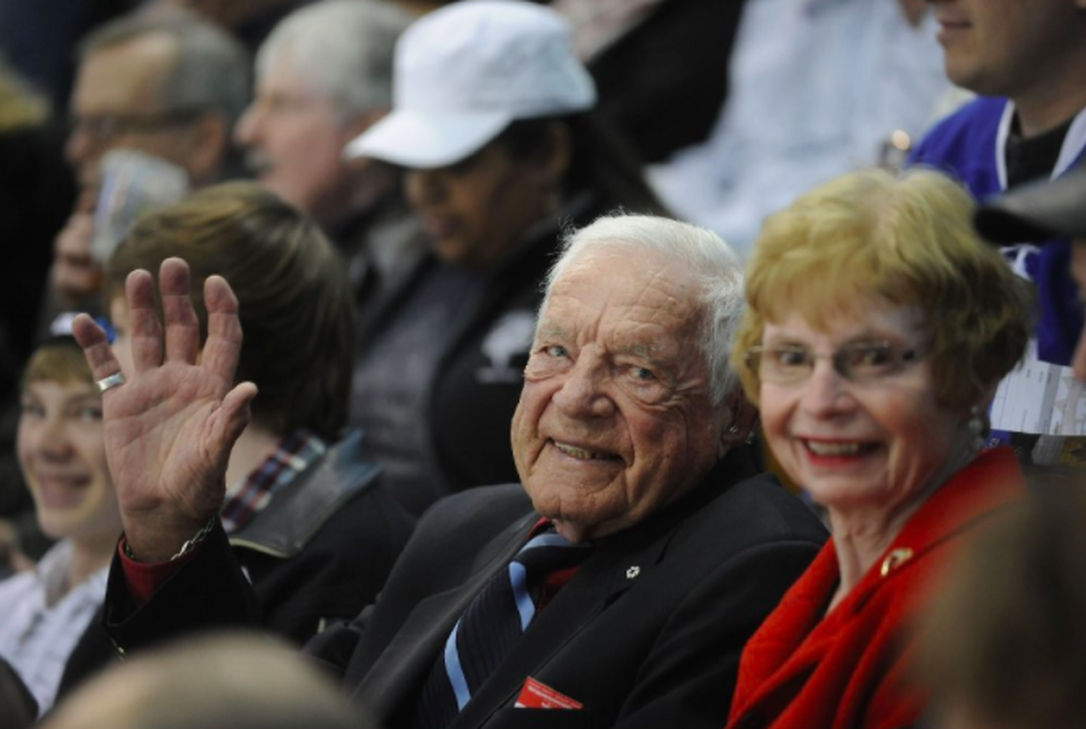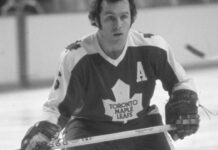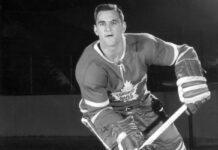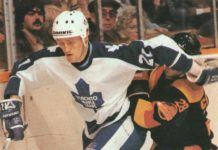While I likely saw Howie Meeker on Hockey Night in Canada before this particular memory, the first time seeing him that stands out in any way was his analysis on TV of the ’72 Summit series between Russia and Canada in the late summer of 1972.
I was in my later teens at the time and had been a fervent hockey follower (Leafs, Leafs, and more Leafs) since the late 1950s. His ability to analyze and break down games was already well-regarded. It was in many ways very different from what we had seen before him and it was a breath of fresh air: Quick, high-energy. Not unfair or unduly harsh, but few punches were pulled if he had a criticism to make.
That said, the comment that stuck out for me at the time was his reference to the Soviet players as having, to paraphrase, no heart. He was pretty much saying they played like robots.
While the comment was likely embraced throughout Canada as being on the money, fair and accurate, even as a young person back then, I found it a bit much. Yes, politically, Canada and the Soviets were miles apart, and few if any had much regard for the Soviet system of government or what certainly seemed to be the unfairly harsh lives (as best we could tell) most of their citizens had to endure.
But in hockey terms, I thought the Russians played a quite creative, brilliant kind of game. Free-flowing, lots of circling (though that could get to be a bit much) and passing that was based on “system” play, preparation, and discipline. But also lightning-fast reactions and instincts.
Howie was no doubt just being honest in saying what he did. But Meeker was seemingly also playing off the classic Canadian theme that our guys played with heart, with great emotion — that was true — and that’s why they would outlast the Soviets in the end.
But I did not then, and still don’t, think that the Russian players necessarily lacked emotion or heart.
They competed and competed hard. But their national mentality, if I can call it that, and the way they were coached, created an enforced “sameness” in how they played and reacted to situations that meant they could rarely appear happy even if they were, like after scoring a goal. Celebrations were brief, and then it was back to business.
The Ovechkins’ of the time, guys like Kharlamov and Yakushev were every bit as brilliant in their own way and time as the great Russian players of today, but to an extent, their ‘system’ and approach created a lack of individuality within the team structure that created the impression the players, as individuals, had no personality or lacked emotion.
And while I didn’t think that characterization was especially fair, it was a very different time and place. (I’m not sure Canadian hockey fans would embrace a Canadian player intentionally breaking the ankle of a Russian player today in a major international competition, as Bobby Clarke did to the great Kharlamov during the ’72 Series— an incident which surely helped put Canada over the top and was widely applauded in Canada as a good thing and simply part of the “war” between two hockey nations.)
That said, Meeker may not have been entirely off base in his assessment of the Soviets. The sort of super constrained, show-no-emotion mentality of those Russian teams may have lessened the ability of those players to have and express, rather than suppress, the natural ebb and flow of their emotions—or at least to feel as though they could express them and move on, as opposed to feeling pent-up—and play with the fearless abandon Canadians did. Who knows? (A few years later in 1979, the Soviets hammered the NHL All-Stars in the deciding game of the much-ballyhooed Super Series, so they certainly had the right mix of skill and heart to win that Series handily against the best NHLers in the world.)
Regardless, Howie Meeker was the perfect Canadian in that early ‘70s hockey role, as he began to build his persona and his “brand” during that historic and memorable hockey series. Howie was the guy to whom we all turned to see what he had to say about those games, just as years later many Canadians couldn’t take their eyes off Don Cherry while he held sway over Coach’s Corner, never quite knowing what might well be said next.
As a player, Meeker won his four all with the Leafs in the late ‘40s and early ‘50s. Meeker was one of the Leafs on the ice and helped set up the famous 1951 Bill Barilko overtime winner in the spring of 1951 against the Montreal Canadians at Maple Leaf Gardens. Earlier in his career, he had been the NHL Rookie-of-the Year in his first season with the Leafs.
He wasn’t the most skilled guy by all accounts, including his own, but he was known as a determined, hard-driving player who made his teams better.
In any event, Meeker became a mainstay on HNIC for a long time. He was entertaining, knowledgeable, and way ahead of his time in being able to break down the details of the game for we everyday hockey fans. He developed a strong following because he knew the game and was a joy to watch. (He had been the coach and also GM of the Leafs under Conn Smythe for a brief period of time in the mid-1950s, though he wasn’t given the chance to really finish the job.)
Howie became famous for his rather excited mannerisms when describing things he liked, and a handful of phrases that he would utilize (and sometimes wear out) on a pretty regular basis. But I remember quite distinctly him being a guy who would also be quite specific in his commentary when a player messed up for not reading a play correctly, or not making the right pass, or failing to “finish his check”.
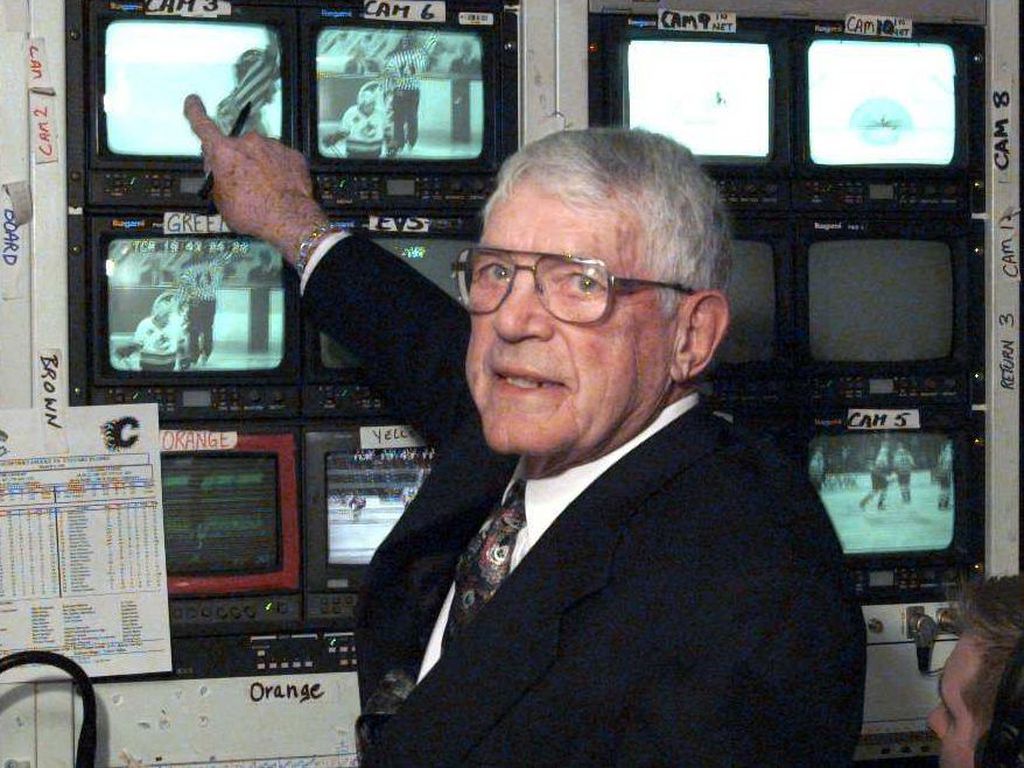
People simply got a huge kick out of Meeker, I think in part because they were watching someone talk about and analyze the game that obviously loved hockey as much as they did.
Now I remember and have written about a lot of old Maple Leafs over the years. Those personal recollections go back to the late 1950s. But I was “too young” to have ever watched Meeker play, though like all Leaf fans of a certain vintage, we all knew he had been a small but key player for those championship squads of the late 40s and early ‘50s, and was an important part of the Toronto Maple Leaf heritage and legacy.
While I like many others didn’t follow his playing days or brief time as Leaf Coach and GM, most if not all Canadian hockey fans grew to know and admire Howie as an emerging TV icon.
He spoke about Newfoundland enough in those days that I actually believed he had been born and raised there. It was some time before I even realized he had been born in a small town in Ontario, but moved to Newfoundland after his time with the Leafs to help build up the local hockey programs there.
(I just now recalled as I’m writing this, that I saw Howie on TV back in the early ‘60s during the Leaf-Red Wing Cup finals in the spring of 1963, I think it was. Newfoundland-born Alex Faulkner was the hero of Game 3 in Detroit when he scored two goals and was interviewed after the game outside the Detroit dressing room and Meeker was, I believe, one of the broadcasters working for the CBC that night and interviewing Faulkner. This was long before Meeker became a regular on the program, but like Faulkner, he was a Newfoundlander by that point, and not many from that province had the opportunity to get to the NHL in those days.)
Meeker stayed out east for a quarter of a century, before moving cross-country to British Columbia.
After he stopped doing the HNIC in-between periods gig, I remember his work primarily with Dave Hodge in the early days in the Toronto studios, and he worked with a number of other hosts in Vancouver doing the Canuck games for many years.
All the while, Meeker had been running his very popular hockey schools out East (not sure if he did the same in B.C.) and a series of similarly well-regarded hockey instructional videos for kids and coaches as well.
I never had the opportunity to meet or interview Howie, but by all accounts, he was a proud Canadian that loved life— a family man who was a good and caring individual.
Sometimes we see people on TV, and the ‘person they ‘show’ is certainly part of who they are, but surely not the whole person. It’s part show biz, part entertainment, part ‘act’. But you just knew that there was more to Howie Meeker than “Golly gee whiz” or whatever those expressions were that he pulled out of his hat every Saturday night for years.
This was someone (he, like other Leafs greats Syl Apps and Red Kelly, had been an elected officials for a time— Howie, like Red, as a Member of Parliament) who was a teacher, an instructor, a coach. He was also a motivator, and an inspiration to many—devoted to his family but also to Canada and to teaching kids about a game he knew so well.
He taught it to youngsters at his hockey schools, in his instructional videos, in his time as an analyst on Hockey Night in Canada. He taught it with energy, with flair, and probably helped millions of young Canadians to fall in love with the game as almost as much as he loved it.
Howie lived to be 97. Plenty of honours came his way over the years, including the Order of Canada. No doubt, those honours meant a great deal to him.
But if I had to guess — and it is only a guess — I’d guess this: if he ever fully understood the impact he had on so many Canadians over so many years, that may have been one of his biggest thrills of all.
Howie Meeker was all Canadian and in turn, he became an all-time “All Canadian.” He was ours. Proud but humble. Straight-talking and honest but considerate.
When someone dies, we often say, “They don’t make them like that anymore.” We mean that as a sincere sentiment — a genuine compliment to show that person was someone who stood apart.
I don’t know if that statement is ever completely accurate, though we are surely all unique in our own way.
But in Howie Meeker’s case, maybe there only had to be one anyway, because he had an impact that was real, genuine— and lasting.























